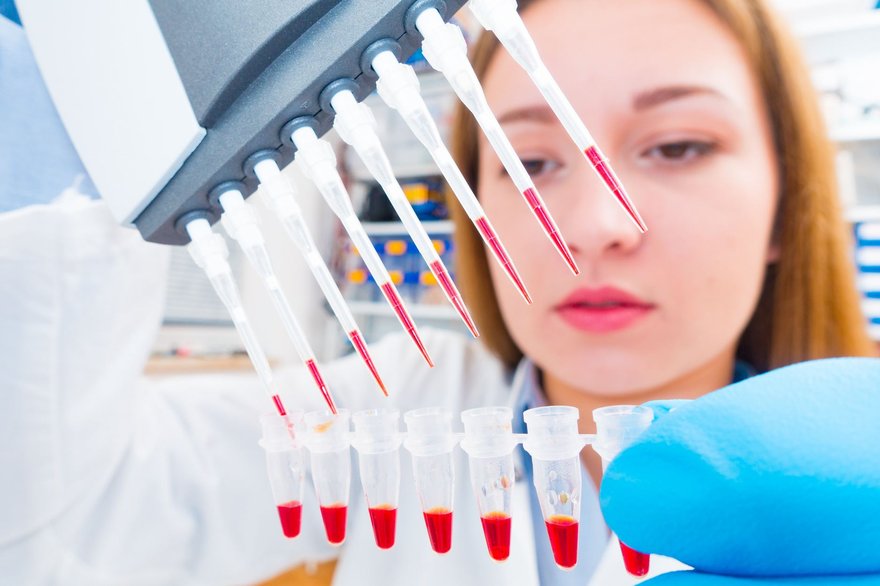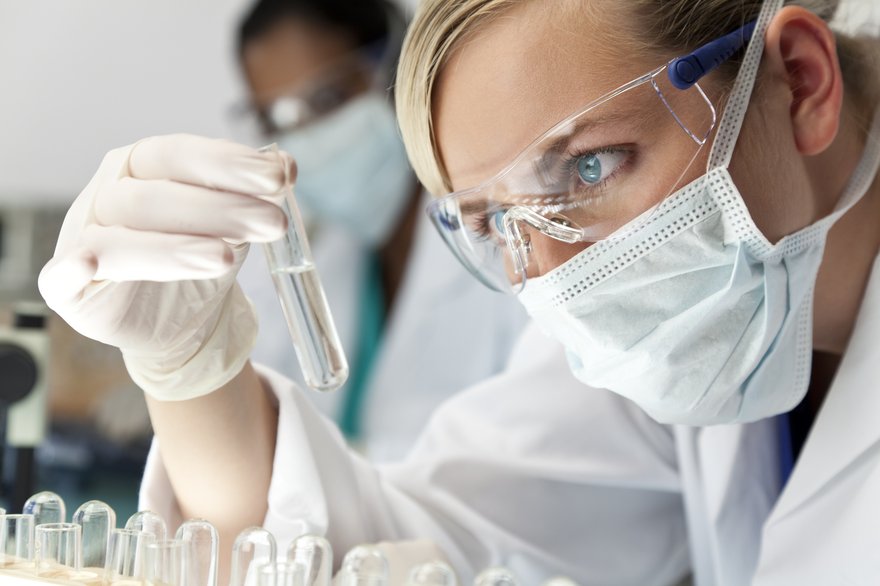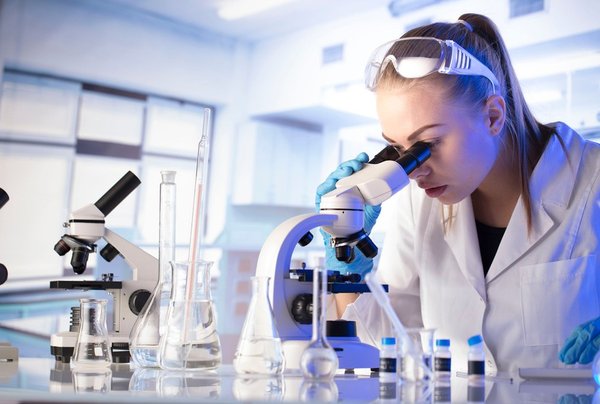Some scientists believe that we’re in the golden age of biotechnology. Scientific advances are creating new and previously only imaginable ways to treat and prevent diseases.
The biotech sector is also presenting exciting opportunities for investors. Many of the best biotech companies have both strong drug candidate pipelines and winning drugs already on the market. The COVID-19 pandemic has also created massive opportunities for biotechnology companies that are developing treatments and vaccines for the virus.

Top biotech stocks in 2024
Top biotech stocks in 2024
These are a few biotech companies to watch closely in 2024:
| Company | Market Capitalization | Primary focus |
|---|---|---|
| Axsome Therapeutics (NASDAQ:AXSM) | $3.5 billion | Neuroscience |
| Exelixis (NASDAQ:EXEL) | $7.2 billion | Cancer |
| Intellia Therapeutics (NASDAQ:NTLA) | $2.4 billion | Cancer, genetic diseases |
| Regeneron Pharmaceuticals (NASDAQ:REGN) | $104.4 billion | Autoimmune diseases, cancer, eye diseases, infectious diseases |
| Vertex Pharmaceuticals (NASDAQ:VRTX) | $105.8 billion | Rare diseases, diabetes |
| Twist Bioscience NASDAQ:TWST) | $1.9 billion | Synthetic DNA |
1. Axsome Therapeutics
Axsome launched Auvelity in October 2022 as a treatment for major depressive disorder. The drug, also known as AXS-05, is also being evaluated in a late-stage clinical trial targeting Alzheimer's disease agitation and in a phase 2/3 study as a smoking cessation therapy.
The company’s pipeline includes three other late-stage candidates. AXS-07 targets the treatment of migraine. AXS-12 targets narcolepsy, a disorder where individuals are sleepy during daytime hours. AXS-14 targets the chronic pain disease fibromyalgia.
Two of these three drugs could be on the market in the not-too-distant future. Axsome expects to resubmit for U.S. Food and Drug Administration (FDA) approval of AXS-07 in the second half of 2023. The company also plans to file for FDA approval of AXS-14 in 2023.
Auvelity could be a blockbuster drug in treating depression, with peak annual sales -- the highest dollar volume of sales per year projected by analysts -- estimated at $2.6 billion. The peak annual sales forecast for AXS-07 in the U.S. alone is more than $500 million per year. Analysts think that AXS-14, if approved, could generate peak sales of between $500 million and $1 billion. The revenue potential for the three drug candidates makes Axsome Therapeutics an attractive biotech stock to consider buying in 2023.
2. Exelixis
Exelixis has developed four drugs that are already on the market. Its biggest winner by far is Cabometyx, which is approved to treat renal cell carcinoma (RCC) and hepatocellular carcinoma (HC) -- the most common types of kidney cancer and liver cancer, respectively -- as well as thyroid cancer.
Exelixis and biopharma company Bristol Myers Squibb (BMY 0.34%) won U.S. regulatory approval in early 2021 for the use of Cabometyx in combination with Bristol Myers' immunotherapy drug Opdivo. The company hasn't fared so well with another collaboration. Exelixis and Roche (RHHBY 0.77%) announced disappointing results in March 2023 from a late-stage study evaluating Cabometyx and Roche's Tecentriq in treating RCC.
Exelixis is profitable, which enables it to use its fast-growing cash stockpile to enter into new licensing agreements and expand its drug offerings. It licenses from the development-stage biotech company Aurigene the right to develop a promising early-stage cancer drug called XL102. From WuXi Biologics, the company licenses a panel of monoclonal antibodies. Exelixis also acquired GamaMabs Pharma’s anti-Müllerian hormone receptor 2 (AMHR2) antibody programs.
3. Intellia Therapeutics
Intellia Therapeutics is a pioneer in CRISPR gene editing. The company doesn't have any products on the market yet. However, its pipeline looks promising.
NTLA-2001 is Intellia's lead pipeline candidate. Intellia and its partner, Regeneron, announced positive interim results in November 2022 from a phase 1/2 study evaluating the drug in treating transthyretin amyloidosis with cardiomyopathy (ATTR-CM), a rare genetic heart disease. The two partners hope to begin a pivotal clinical trial of NTLA-2001 by the end of 2023, pending regulatory feedback.
Intellia also reported positive interim results in November 2022 from a phase 1/2 study evaluating NTLA-2002 in treating hereditary angioedema (HAE), a rare genetic disease that causes swelling under the skin and in the lung and intestinal linings. The company has already advanced the drug into phase 2 testing in New Zealand and is seeking to move forward with U.S. phase 2 testing.
It's possible that Intellia could have another clinical program soon. The company expects to file for regulatory approval in the second half of 2023 to initiate an early-stage clinical trial evaluating NTLA-3001 in treating alpha-1 antitrypsin deficiency (AATD), a rare genetic liver disease.
4. Regeneron Pharmaceuticals
The biggest moneymaker for Regeneron is Eylea, an eye disease drug that the company makes in collaboration with Bayer (BAYR.Y 1.65%). All net sales from Eylea in the U.S. are awarded to Regeneron, and the company splits with Bayer the revenue earned from markets outside the U.S.
Regeneron also has a lucrative partnership with Sanofi (SNY -0.47%), another life sciences and pharmaceutical company. Together, the two companies are marketing and selling the autoimmune disease drugs Dupixent and Kevzara, the cancer drugs Libtayo and Zaltrap, and the cholesterol drug Praluent.
The company won initial approval from the FDA in February 2021 for Evkeeza in treating homozygous familial hypercholesterolemia (HoFH), a rare form of high cholesterol, in patients ages 12 and older. It also picked up an additional approval for the drug in March 2023 for treating HoFH patients between the ages of 5 and 11.
Several of Regeneron’s drug development programs are focused on gaining approvals for new indications for already approved drugs. The company also is developing new drug candidates, notably including the experimental gene-editing therapy NTLA-2001, which Regeneron is developing in partnership with Intellia Therapeutics.
5. Vertex Pharmaceuticals
Vertex, which makes multiple cystic fibrosis (CF) drugs, enjoys a near-total monopoly over sales of treatments for the underlying cause of CF. Its pipeline also includes another promising CF therapy in phase 3 testing.
While Vertex's CF franchise has room to grow, the company has its sights set beyond CF as well. Vertex and CRISPR Therapeutics (CRSP 0.34%) await regulatory approvals for gene-editing therapy exa-cel in treating rare blood disorders sickle cell disease and transfusion-dependent beta-thalassemia.
The company expects to wrap up a late-stage study of non-opioid pain drug VX-548 by early 2024. It's also evaluating inaxaplin in a pivotal study as a treatment for APOL1-mediated kidney disease.
Vertex is already profitable, which provides a large cash stockpile it can use to further bolster its drug candidate pipeline.
6. Twist Bioscience
Twist Bioscience developed a proprietary technology for “writing” DNA on a silicon chip. The synthetic DNA the company manufactures is used in synthetic genes, next-generation sequencing preparation, and antibody libraries used by biopharma companies to discover and develop drugs.
Twist's customers span several industries, including academic research, agriculture, healthcare, and industrial chemicals. The company isn’t profitable yet. However, Twist’s sales continue to rapidly grow as it launches new products based on its synthetic DNA.
Twist estimates that its current serviceable addressable market stands at close to $6 billion per year. However, the company could have a much larger opportunity in storing data on its DNA chips, in the ballpark of $35 billion annually. While Twist’s DNA data storage efforts are still in the early stages, the company has already achieved key milestones and expects to offer early access to its technology by late 2023.

Understanding the biotech industry
Understanding the biotech industry
A biotechnology company uses living organisms such as bacteria or enzymes to make drugs. The use of living organisms differentiates biotechnology companies from pharmaceutical companies, which research and develop chemicals to invent drugs.
Investors should pay close attention to each phase of a biotech company's drug candidates. Drugs in later phases are more likely to succeed, making investing in that company less risky. There are four major steps and three phases that biotech companies follow to develop new drugs:
- Drug discovery: A biotech company first identifies a drug candidate and the diseases that it potentially can target.
- Preclinical testing: The company tests the drug candidates in vitro (in test tubes) and/or in vivo (in living animals such as mice).
- Clinical testing: The drug candidate is tested on humans. Clinical testing generally occurs in three phases:
- Phase 1: Small studies are conducted to find a safe dose for the drug candidate and determine how the drug affects humans.
- Phase 2: Larger studies involving around 100 or more patients are conducted with a focus on safety and short-term side effects and to determine the optimal dose for the drug.
- Phase 3: Even larger studies, with hundreds or even thousands of patients, are conducted to demonstrate how effectively and safely the experimental drug treats the target disease.
- Regulatory approval: A biotech company must obtain regulatory approval before it can sell a drug. The biotech company files for regulatory approval from the FDA, using the clinical testing data that it has generated.
Most biotech companies have many drugs simultaneously under development, which provides multiple revenue streams. The safest biotech investments are focused on more than just a few experimental drugs.
Many growing biotech companies often generate cash by issuing new shares of stock, which dilutes the value of the existing shares. Some biotechnology companies also receive -- and may be heavily dependent upon -- money obtained via partnerships with larger drugmakers or grants from government agencies and nonprofit organizations. Mergers and acquisitions are common in the biotech sector, which means that any of the most promising biotech companies could be acquired by their larger competitors.
Related investing topics
Should you invest?
Should you invest in biotech stocks?
Investing in biotech stocks can be risky because it's possible that a company's drug candidate proves ineffective or worse in clinical testing. And, even if testing goes well, biotech companies have no guarantee that a drug will be approved by the FDA.
The least risky biotech companies have drugs already commercially available and many drugs in later phases of testing. The best biotech companies also develop drug candidates with peak annual sales that are forecast to be high.
You can reduce your investment risk by focusing on biotech companies with strong financial positions. Biotech companies that already sell one or more drugs are much more likely to be profitable, and they are less likely to use creative means to generate the significant amounts of cash required to fund drug research and development. Biotech companies that are unprofitable are at risk of not having enough money to successfully fund clinical studies and complete regulatory filings to bring a new drug to market.
The best biotech companies are well-positioned to deliver tremendous returns over long periods of time, making them well-suited for buy-and-hold investors.
Keith Speights has positions in Bristol Myers Squibb and Vertex Pharmaceuticals. The Motley Fool has positions in and recommends Axsome Therapeutics, Bristol Myers Squibb, CRISPR Therapeutics, Intellia Therapeutics, and Vertex Pharmaceuticals. The Motley Fool recommends Exelixis and Roche Ag. The Motley Fool has a disclosure policy.







